

Find Open Source Alternatives to commercial software. Whonix - Anonymous Operating System. Free Software on the final frontier: GNU Radio controls the ISEE-3 Spacecraft. The International Sun-Earth Explorer-3, or ISEE-3, was launched in 1978 by NASA to monitor activity on the sun.
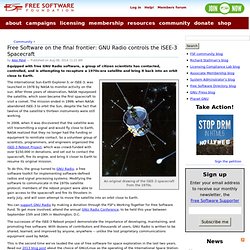
After three years of observation, NASA repurposed the satellite, which soon became the first spacecraft to visit a comet. The mission ended in 1999, when NASA abandoned ISEE-3 to orbit the Sun, despite the fact that twelve of the satellite's thirteen instruments were still working. In 2008, when it was discovered that the satellite was still transmitting a signal and would fly close to Earth, NASA realized that they no longer had the funding or equipment to reinitiate contact. So a volunteer group of scientists, programmers, and engineers organized the ISEE-3 Reboot Project, which was crowd-funded with over $150,000 in donations, and set out to contact the spacecraft, fire its engine, and bring it closer to Earth to resume its original mission.
You can support GNU Radio by making a donation through the FSF's Working Together for Free Software Fund. Support Ticket System. TrueCrypt, the final release, archive Yes . . .
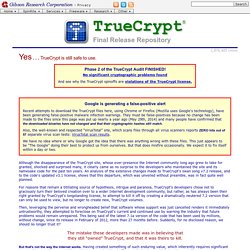
TrueCrypt is still safe to use. Google is generating a false-positive alert Recent attempts to download the TrueCrypt files here, using Chrome or Firefox (Mozilla uses Google's technology), have been generating false-positive malware infection warnings. They must be false-positives because no change has been made to the files since this page was put up nearly a year ago (May 29th, 2014) and many people have confirmed that the downloaded binaries have not changed and that their cryptographic hashes still match.
Also, the well-known and respected “VirusTotal” site, which scans files through all virus scanners reports ZERO hits out of 57 separate virus scan tests: VirusTotal scan results. We have no idea where or why Google got the idea that there was anything wrong with these files. The mistake these developers made was in believing thatthey still “owned” TrueCrypt, and that it was theirs to kill. But that's not the way the Internet works. Open Source Comes to Campus. Open Source Comes to Campus/In a Box - OpenHatch wiki. This page is deprecated.
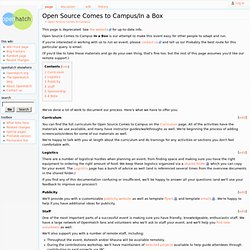
See the website for up-to-date info. Open Source Comes to Campus In a Box is our attempt to make this event easy for other people to adapt and run. If you're interested in working with us to run an event, please contact us and tell us so! Probably the best route for this particular query is email. (If you'd like to take these materials and go do your own thing, that's fine too, but the rest of this page assumes you'd like our remote support.) The Architecture of Open Source Applications. Returning to Free Software: A Guide. A month or two ago, I made a conscious decision that I would return to using as much Free Software as possible.
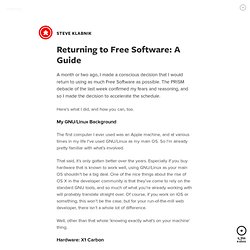
The PRISM debacle of the last week confirmed my fears and reasoning, and so I made the decision to accelerate the schedule. Here’s what I did, and how you can, too. My GNU/Linux Background The first computer I ever used was an Apple machine, and at various times in my life I’ve used GNU/Linux as my main OS. Linux.
Linus Torvalds and Others on Community Burnout. Hang around the free and open source software community for any length of time, and you can't help seeing examples of burnout.
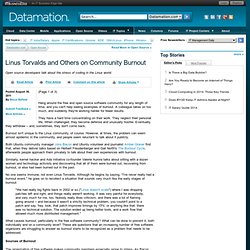
A colleague takes on too much, and suddenly they're working harder for fewer results. They have a hard time concentrating on their work. They neglect their personal life. When challenged, they become defense and unusually hostile. Eventually, they withdraw -- and, sometimes, they don't come back. Burnout isn't unique to the Linux community, of course. Both Ubuntu community manager Jono Bacon and Ubuntu volunteer and journalist Amber Graner find that, when they deliver talks based on Herbert Freudenberger and Gail North's The Burnout Cycle, afterwards people approach them privately to talk about their own experiences with burnout.
No one seems immune, not even Linus Torvalds. Why I’m not an open source person any more. I’ve been having this conversation a bit lately so I just wanted to put it out there.
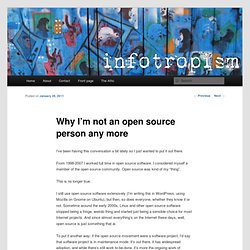
From 1998-2007 I worked full time in open source software. I considered myself a member of the open source community. Open source was kind of my “thing”. This is no longer true. I still use open source software extensively (I’m writing this in WordPress, using Mozilla on Gnome on Ubuntu), but then, so does everyone, whether they know it or not.
FLOSS papers. Contributing to Open Source Projects HOWTO. This page is aimed at programmers new to the Open Source / Free Software world, who want to make a contribution, but aren't sure where to start. The latest version of this document is at www.kegel.com/academy/opensource.html. Contents Triage Triage is the fine art of looking at bug reports from users, deciding if they're repeatable, and if so, passing the proper information on to the developers. OpenHatch - Community tools for free and open source software. How to Contribute to Open Source Projects. Open Source Apps: the Monster List. It's become something of an annual tradition at Datamation to end the year with a gigantic compilation of all the open source software we've surveyed over the past twelve months or so.
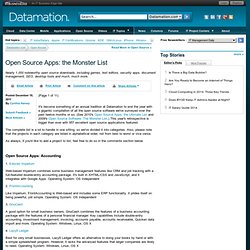
Freecode.com. OpenSourceList.org. Libraries. Below is a list of libraries, products, and tools implementing current OpenID specifications and related specs. While several of these implementations have been tested, they are maintained by members of the OpenID community or vendors and are not necessarily known to work. Please review the documentation and test your own implementation thoroughly before releasing to the public. To discuss these implementations, please consider joining the code@openid.net mailing list. Ohloh, the open source network. Open Source Delivers. OpenWack - Free Community Software. ShareSource » Open source code and project hosting. Discourse. Opensource.org. X.org. The X.Org project provides an open source implementation of the X Window System.
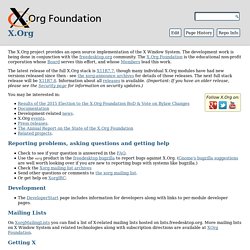
The development work is being done in conjunction with the freedesktop.org community. The X.Org Foundation is the educational non-profit corporation whose Board serves this effort, and whose Members lead this work. The latest release of the full X.Org stack is X11R7.7, though many individual X.Org modules have had new versions released since then - see the xorg-announce archives for details of those releases. The next full stack release will be X11R7.8. Information about all releases is available. You may be interested in: Reporting problems, asking questions and getting help. Eleven Open Source Cloud Computing Projects to Watch. Welcome to Cloud Foundry. OpenStack Open Source Cloud Computing Software. IBM Makes a Big Bet on OpenStack In the Cloud - Arik Hesseldahl. Eucalyptus in the cloud: researchers commercialize OSS project - Ars Technica. The Eucalyptus project, which aims to provide open source infrastructure for cloud computing, is growing beyond its university roots and is heading straight for enterprise data centers.
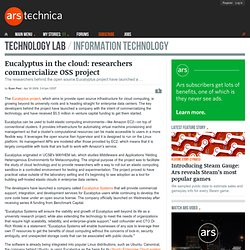
The key developers behind the project have launched a company with the intent of commercializing the technology, and have received $5.5 million in venture capital funding to get them started. DVCS-Autosync: A personal Dropbox replacement based on Git. Executive summary dvcs-autosync is a project to create an open source replacement for Dropbox/Wuala/Box.net/etc. based on distributed version control systems (DVCS).
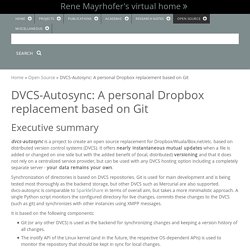
It offers nearly instantaneous mutual updates when a file is added or changed on one side but with the added benefit of (local, distributed) versioning and that it does not rely on a centralized service provider, but can be used with any DVCS hosting option including a completely separate server - your data remains your own. Synchronization of directories is based on DVCS repositories. Git is used for main development and is being tested most thoroughly as the backend storage, but other DVCS such as Mercurial are also supported. dvcs-autosync is comparable to SparkleShare in terms of overall aim, but takes a more minimalistic approach. A single Python script monitors the configured directory for live changes, commits these changes to the DVCS (such as git) and synchronizes with other instances using XMPP messages.
Download.